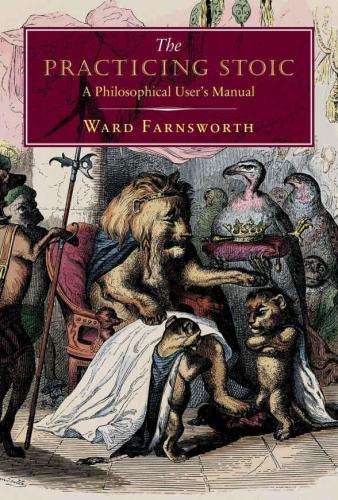
The Practicing Stoic
A Philosophical User's Manual
- اطلاعات
- نقد و بررسی
- دیدگاه کاربران
نقد و بررسی

June 15, 2018
The aim of the various philosophies of ancient Greece and Rome was to understand a life well lived. Of these, Stoicism had a particular attraction to the pragmatic Roman aristocracy. Farnsworth (dean, Univ. of Texas Sch. of Law; Farnsworth's Classical English Rhetoric) presents a practical guide to Stoic ethics from luminaries such as Marcus Aurelius, Seneca, and Epictetus, explicating the Stoic's task of ordering the externals in one's life (health, wealth, position, etc.) according to virtue (proper ordering in accordance with nature) using topically arranged quotations. These are supplemented by the author's own commentary and that of sympathetic thinkers. With a practical aim, he focuses on the techniques Stoics used to order oneself according to virtue, such as analyzing value judgments, intentional perspective, and detachment. Extensive quotations both enhance the presentation of Stoicism and counter the typical criticism that Stoics were unfeeling. VERDICT Scholars are bound to object that Farnsworth has not placed Stoicism on the intellectual footing it deserves. What's certain is that he has rightly transformed the idea of being stoical, from one being coldly logical to warmly philosophical.--James Wetherbee, Wingate Univ. Libs., NC
Copyright 2018 Library Journal, LLC Used with permission.

June 1, 2018
This sturdy and engaging introductory text consists mostly of excerpts from the ancient Greek and Roman Stoic philosophers, especially Seneca (4 BCE-65), Epictetus (c. 55-135) through his student Arrian, and Marcus Aurelius (121-80) as well as that trio's philosophical confreres, from the earlier Hellenic Stoics and Cicero to such contemporaries as Plutarch to moderns, including Montaigne, Adam Smith, and Schopenhauer. Their most lasting ideas have to do with the ethics and psychology of personal conduct. The purpose of life is service to others, and reason and informed intuition are the tools of effective service. We control our judgments, opinions, and attitudes and react to them, and it is important to reign in emotions, especially grief, to perceive what is reasonably possible to do. Recognize the externals that sway judgment, such as accidents, death, natural events, and the actions of others, and react only to what we can control. A philosophy to live by, Stoicism may remind many of Buddhism and Quakerism, for it asks of practitioners something very similar to what those disciplines call mindfulness.(Reprinted with permission of Booklist, copyright 2018, American Library Association.)




دیدگاه کاربران